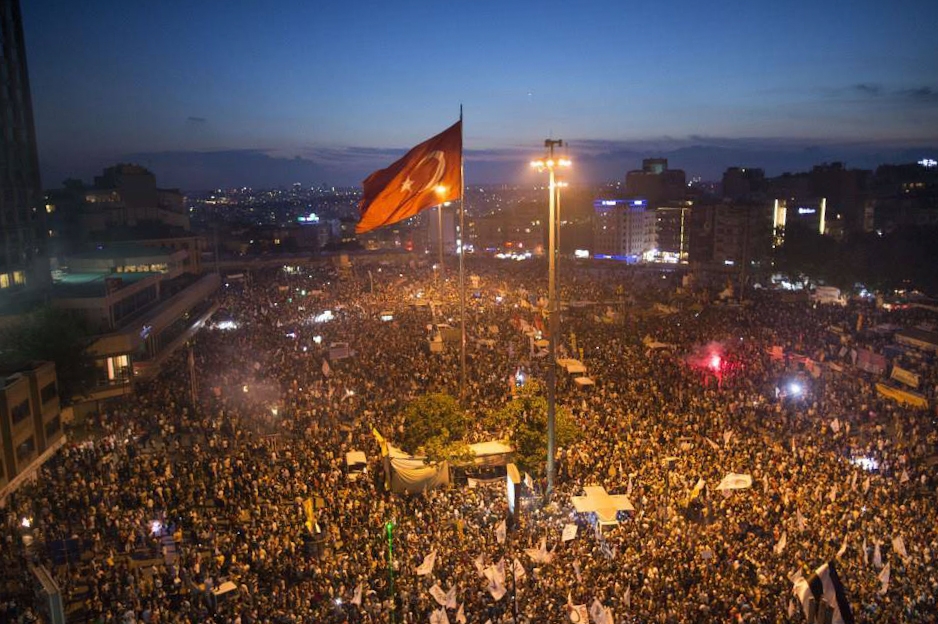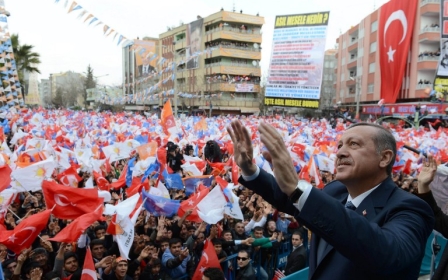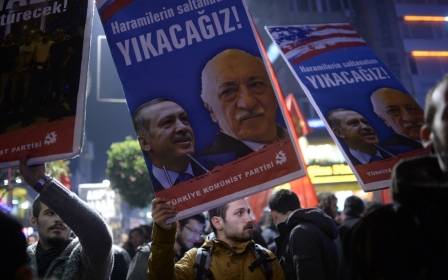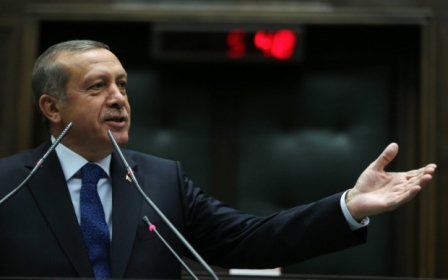Old problems in a ‘new Turkey’

During its 12 years of political rule, the AKP (Justice and Development) government has embarked upon a deep domestic transformation with the stated plan of building a “new Turkey”. Yet it has never said precisely what this term represents.
The AKP’s plan to build a “new Turkey” has been welcomed by diverse sections of society who often have little in common except a joint desire for large-scale changes - first and foremost among these being an abolishment of the established order.
"The 'New Turkey' metaphor represents a renewal and transformation of the regime in a sense. A new meaning was attributed to the 'new Turkey' concept which includes an inversion of a bureaucratic republic to democratic republic, removing obstacles to freedoms and more importantly a 'change of the order'.” writes academician and columnist Huseyin Yayman.
The endorsement of AKP’s “new Turkey” vision signifies that many in Turkey are are happy to indulge a deviation from the long-established order – the so-called Kemalist system which attaches primary importance to secular public order and national unity.
In a country where people from all regions or classes have their own gloomy memories vis-a-vis military coups and decades of political and economic hardships and violence - notably the armed conflict in the Southeast - the social readiness for change is understandable.
This readiness for change comes in cycles. In constitutional referendums in 2007 and 2010, the electorate opted in favour of reform packages with resounding 68% and 58% votes. The AKP government has been victorious in six (two legislative and three municipal) consecutive elections between 2002-2014.
With the highest public support ever gained by an incumbent Turkish government, the AKP and its leader, Prime Minister Recep Tayyip Erdogan, have implemented a clear agenda and accomplished fundamental changes.
Erdogan’s party has most importantly restored civilian authority, and it has also increased religious freedoms, promoted to a certain extent minority rights, reformed the judiciary and accepted to carry out negotiations with the PKK (Kurdistan Workers Party) thus securing a ceasefire in the Southeast.
Lack of consensus
Yet the “new” Turkey aimed for in all the transformative enterprises remains somehow recognizable. There are sharpening socio-political cleavages, inhibitive public sphere regulations, excessive police enforcement, economic fluxes and refluxes and there is the still unresolved Kurdish question. The country continues to tackle the same chronic drawbacks attributed to the “Kemalist” system.
Moreover, in the “new” Turkey, old problems usher in more severe social predicaments if compared to the pre-AKP period. A consolidation of voters around incompatible world views, and an increased intolerance of anything which is “unlike the self” is a current now emerging as a “social trend”.
Both in Turkey and the world, Erdogan is often criticized for exacerbating such trends with a rhetoric based on an “us and them” dichotomy. Indeed, in his public speeches Erdogan repeatedly portrays himself and his supporters as “downtrodden victims” of the “old Turkey”.
He condemns his opponents by calling them, in line with his personal world view: “traitors”, “leftists”, “atheists” or “pincers of foreign powers”.
At any rate, Erdogan has succeeded in earning the allegiance of the majority of the electorate. His rhetoric is credited by his supporters through slogans as “stand up straight, don’t bow, this nation is with you!”.
Essentially, the old, structural problems of Turkey constrain the Erdogan government in the same way as they have constrained its predecessors. Amid the lack of a truly pluralistic social order and consensual political culture, the Turkish political sphere has been ineffective in addressing diverging social demands. Political parties and governments have been affected by the social divisions and merely vshored up their electoral cores in an uncompromising response.
Aggressive political discourse and antipathy towards “other” political groups and their supporters have been a dominant attribute of the Turkish political culture. In this sense, the belligerent AKP confirms the continued existence and even solidification of this attribute, despite the assertion of instituting a new order.
Towards a new political culture?
Nevertheless, Erdogan and his partners are likely well aware that Turkey needs a harmonious social structure and conciliatory political system.
Today’s belligerent and exclusionary politics are actually the consequences of AKP’s reactive and rather secondary strategy, which fundamentally aims at consolidating electoral allegiance and disseminating the figure of Erdogan as a powerful political leader, “who does not bow!”.
The AKP’s primary objective, on the other hand, is certainly building a “new Turkey”, but “with an old twist”.
During the last municipal elections campaign, Erdogan began to reveal his vision on the country’s future by conveying his keenness for the first parliament inaugurated on 23 April 1920, positing it as a model for conciliatory politics.
After the elections, he reiterated his vision by saying “it is an unavoidable necessity to render the supremacy of the first parliament’s spirit”. Erdogan’s many colleagues, like the head of the parliament Cemil Cicek, believe also that “Turkey has for too long neglected the philosophy of the first parliament and now needs to greatly adopt it”.
In Turkey, for those longing to witness the breakup of the official polity, the first parliament has often been an ultimate reference. It is mainly prominent because it saw the ascendancy of Anatolian clan leaders, religious elites and squires – those groups considered as “excluded” by republican elitism. It had not undertaken Ataturk's well-known reforms, except from abolishing the monarchy. Opponents of the official polity such as the pro-PKK groups, and also Erdogan himself, argue that this parliament recognized the Kurds as a nation and Kurdistan as a separate region.
Such perceptions underestimate that the first parliament was assembled under the extraordinary conditions of the Turkish “War of Independence” and cannot be admitted as an institution of a functioning democracy. It served for just three years and was abolished in 1923 just before the declaration of the Republic.
Erdogan and AKP use it mostly as a reference to propagate the idea that Turkey has had an authentic political culture ensuring social cohesion, and that this culture was strictly contained by republican institutions and policies.
It is very likely that AKP’s future political strategy will focus on more explicit disapproval of the institutional structure founded on Republican principles. As Turkey flounders in vicious circles, the government considers that reform packages or constitutional amendments within this structure have bestowed their maximum benefits. It envisages that these transformations and the social readiness that enabled them will however smooth the progress of a new political culture where the new Turkish model will find legitimate grounds.
In the current state of affairs, there are still no concrete evidence about AKP’s concept of “new Turkey” and its political culture. Yet it would be reasonable to advance that pre-republican references will become more influential in Turkey’s imminent socio-political transformation.
- Ozan Serdaroglu has research experience on Turkey and the Eastern Mediterranean, with a focus on political and economic development, Euro-Med relations, conflict management, regional cooperation and energy issues.
The views expressed in this article belong to the author and do not necessarily reflect the editorial policy of Middle East Eye.
Photo credit: Demonstrators in Taksim Square, Instabul on 15 June 2013 (Wikicommons)
New MEE newsletter: Jerusalem Dispatch
Sign up to get the latest insights and analysis on Israel-Palestine, alongside Turkey Unpacked and other MEE newsletters
Middle East Eye delivers independent and unrivalled coverage and analysis of the Middle East, North Africa and beyond. To learn more about republishing this content and the associated fees, please fill out this form. More about MEE can be found here.





